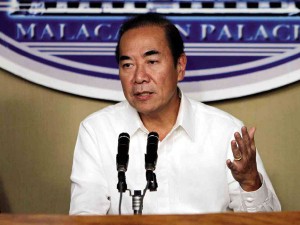Singson issues guidelines on roadside tree cutting
CITY OF SAN FERNANDO— Public Works Secretary Rogelio Singson has outlined a step-by-step protocol, complete with illustrations, to show how government road maintenance crews should treat roadside trees.
Department Order No. 93-2014, which is posted on the website of the Department of Public Works and Highways (DPWH), requires regional and district engineering offices to regularly trim or prune roadside trees “to preclude accidents to motorists and pedestrians caused by trees and their branches falling during heavy winds or storms and other natural and man-made calamities.”
“Only when necessary can DPWH employees cut damaged trees along the right-of-way of our national roads,” the order said.
The agency has been faced with complaints from National Coalition to Save the Trees due to road projects requiring the cutting of trees.
In an e-mailed statement, the coalition said the DPWH order “addresses the lame excuses offered by some local government agencies that they have no budget to maintain or rehabilitate threatened trees along the national highways.”
Article continues after this advertisement“Practicing proper tree pruning or trimming, especially in the early years of a tree’s life, is a preventive measure to reduce the occurrence of defective, high-risk trees with heavy foliage that easily fall over or dangerously lean during powerful storms and heavy winds,” Singson said in the order he signed on Sept. 14.
Article continues after this advertisementThe directive also said the cost of pruning would be shouldered by the DPWH.
“Dead or broken tree branches [that] may fall unexpectedly are a serious safety hazard, as these obstruct a driver’s vision and pose danger while driving,” it said in explaining why trimming or pruning should be part of regular road maintenance activities.
“The cutting of trees should be done only during disaster clearing operations when such trees, toppled by heavy winds, dangerously block the safe passage of motorists and pedestrians; otherwise, cutting should be conducted only upon the approval of the [Department of Environment and Natural Resources] or the local government unit concerned,” the order said.
It enumerated the process of trimming, taking care to emphasize that the activities should not harm the trees.
“When making a cut, take care not to injure the branch collar. Remove first all dead, broken, diseased or problem limbs by cutting them at the point of origin or back to a strong lateral branch. Prune trees damaged by storms or vandalism or ones with dead limbs as soon as possible to avoid insect and disease problems that may develop,” it said.
Singson said government crews should “avoid tearing barks with pruning tools” when removing large branches.
The order, however, did not, make any reference to girdling, a practice that outraged environmentalists who protested the displacement of trees to make way for the widening of the Manila North Road in Pangasinan province in 2013. Girdling involves the stripping of bark encircling the trunk of a tree, which would prevent root nutrients from reaching the branches. Tonette Orejas, Inquirer Central Luzon, and Vincent Cabreza, Inquirer Northern Luzon
